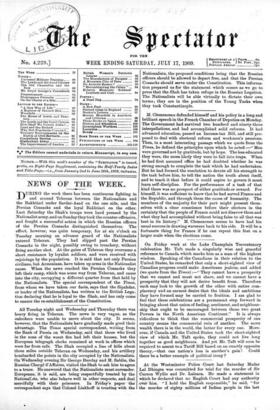M. Clemenceau defended himself and his policy in a long
and brilliant speech in the French Chamber of Deputies on Monday. The Government had survived two hundred and ninety-three interpellations, and had accomplished solid reforms. It had advanced education, passed an Income-tax Bill, and still pro- posed to deal with electoral reform and workmen's pensions. Then, in a most interesting passage which we quote from the Times, he defined the principles upon which he acted :—" Men were governed not by gratitude, but by hope. The less educated they were, the more likely they were to fall into traps. When he had first assumed office he had doubted whether he was strong enough to complete the task which he had undertaken. But he had formed the resolution to devote all his strength to the task before him, to tell the nation the truth about itself, and to teach it that before it could aspire to govern it must learn self-discipline. For the performance of a task of that kind there was no prospect of either gratitude or reward. For himself, it was sufficient to know that he had served France and the Republic, and through them the cause of humanity. The members of the majority for their part might present them- selves with a clear conscience before their electors in the certainty that the people of France could not disavow them and what they had accomplished without being false to all that was best in its history." M. Clemenceau seems to have had his usual success in drawing waverers back to his side. It will be a fortunate thing for France if he can repeat this feat on a larger scale when the elections come.








































